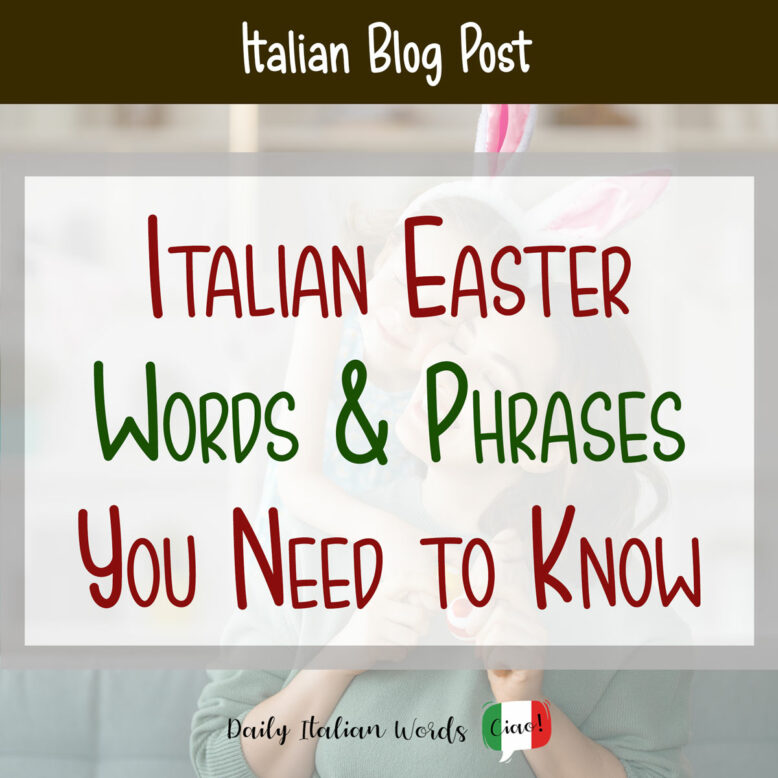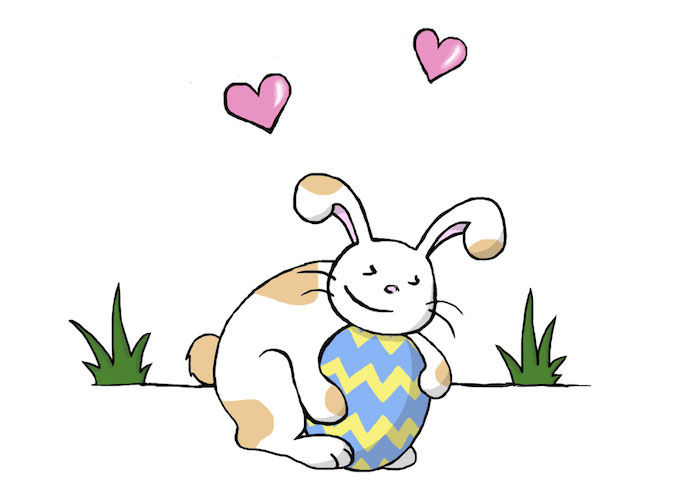Easter is just days away and that means it’s time to paint some eggs, spend time with the people you love, and of course, brush up on your Italian Easter vocabulary if you haven’t done so already! 😉
Perhaps your goal is to be able to say a few phrases when you call or write to your Italian relatives at Easter, or maybe you’re just curious to pick up some new words and expressions. No matter what your motivation is, this article will get you hopping in the right direction!

Happy Easter Greetings & Wishes in Italian
The way you would say Happy Easter! in Italian is Buona Pasqua! which literally translates as Good Easter!
A longer expression you will certainly hear is Auguri di (Buona) Pasqua! which translates as Best Wishes for (a Happy) Easter! This can often be shortened to just Auguri! (Best wishes!) or Tanti auguri! (Many wishes!) if all parties know what the festive occasion is.
If you are preparing an Easter greeting card for someone, you may prefer to choose a longer or more formal greeting. Below are a few phrases that are commonly used:
Auguro a tutti voi una buona Pasqua.
I wish you all a Happy Easter.
Buona Pasqua, amico mio! (to a man)
Buona Pasqua, amica mia! (to a woman)
Happy Easter, my friend!
Buona Pasqua a tutti!
Happy Easter everyone!
Buona Pasqua a te e famiglia! (informal)
Buona Pasqua a Lei e alla Sua famiglia! (formal)
Buona Pasqua a voi e alla vostra famiglia! (plural)
Happy Easter to you and your family!
Ti auguro una serena e buona Pasqua! (informal)
Le auguro una serena e buona Pasqua! (formal)
Vi auguro una serena e buona Pasqua! (plural)
I wish you a serene and happy Easter!
Italian Easter Vocabulary
If your aim is to improve your Italian Easter vocabulary, we suggest writing these words down on some flashcards and practising them daily. You can also find out more about many of these words by following the link to each of their respective ‘word of the day’ articles. Buon divertimento! (Have fun!)

1. Pasqua
English translation: Easter
Related terms worth learning: Pasqua bassa (late Easter in April), Pasqua alta (early Easter in March), pasquale (Easter as an adjective, paschal)
2. Domenica di Pasqua
English translation: Easter Sunday
This day is also known as Domenica della Resurrezione (Resurrection Sunday).
9. Domenica delle Palme
English translation: Palm Sunday (the Sunday before Easter Sunday)
11. Ramoscello d’ulivo
English translation: olive branch
14. Croce
English translation: cross
15. Quaresima
English translation: Lent
16. Chiesa
English translation: church
17. Risorto
English translation: rebirth, rise from the dead
19. Cestino
English translation: basket
20. Gesù
English translation: Jesus
21. Resurrezione
English translation: resurrection
Easter Idioms & Expressions
Natale con i tuoi, Pasqua con chi vuoi.
Literal translation: Christmas with your family, Easter with whomever you want.
English meaning: Traditionally, Christmas is spent with the family whereas Easter can be spent with friends and acquaintances.
Contento come una pasqua
Literal translation: Happy as an Easter
English meaning: to be extremely happy
Fare il giro delle sette chiese
Literal translation: to visit the seven churches
English meaning: the expression stems from the precept that every good Christian should visit seven churches on Good Friday
Italian Easter Songs
Below are a couple of catchy Easter songs you may wish to learn with your children. Both can be found on the Alman Kids YouTube channel. If you’d like to follow along with the lyrics, simply click the “subtitles” button at the bottom of the video.
Uovo di Pasqua, che colore vuoi? (Easter egg, which colour do you want?)
La famiglia uovo (The Egg Family)
How Do They Celebrate Easter in Italy?
Sacred Celebrations
Easter is a Christian holiday commemorating and celebrating the death and resurrection of Jesus Christ. Italy is known for having an abundance of beautiful cathedrals and, who could forget, is also the home of the Vatican City. It should not come as a surprise that Italians love celebrating Easter.
Throughout Holy Week, Italian churches host many events honouring the most important parts of the Passion story. There are processionals on Good Friday parading up and down the streets of town, some including special displays of the Virgin Mary and Jesus. Other churches host torch-lighting ceremonies. Some cathedrals even put on live performances of the Passion and staged plays that follow the Stations of the Cross (a 14-step prayerful devotion contemplating Jesus’s journey to the cross). Another, slightly less biblical, tradition is known as the Blessing of the Eggs where children and adults alike bring a basket of eggs to be blessed by the priest after mass.
Main Attractions
In Florence, the Cathedral of Florence hosts an event known as the Scoppio del Carro (the Explosion of the Cart). A large antique cart is paraded about the city, led by white oxen and followed by more than a hundred people dressed in festive folk-wear. The spectacle ends at the Duomo, where a dove-shaped figure is sent down a wire from the cathedral’s altar to the cart in order to ignite celebratory fireworks.
Rome, the home of the Vatican, hosts many special events during Holy Week. People flock to Saint Peter’s Basilica to hear the Pope’s mass, especially on Good Friday. Friday is a favorite day of the week for visitors to Rome because, after the mass, the Pope begins a candlelit processional in remembrance of Jesus’s walk to the crucifix. The procession begins at the Colosseum and comes to a conclusion at Palatine Hill. This famous spectacle is known as the Via Crucis.
Easter Food
Easter is the second-most celebrated holiday in Italy. For Italians, Easter is a day to be celebrated with friends. Often, friends will gather together for a feast at lunchtime. In Italy, however, lunchtime meals can easily run into dinnertime as well because the guests eat, drink, and chat endlessly. Of course, there are also delicious chocolatey treats to delight children and children-at-heart.
A traditional Easter feast will typically feature agnello (lamb). Paired with the roasted lamb (or whatever meat is being served) are cooked vegetables, often carrots, artichokes, asparagus, or any other vegetables that are in season. Both Easter and Easter Monday (we’ll talk about that in just a moment) feature a lot of eggs – in any form, but especially hard-boiled.
For dessert, many Italians will serve a colomba. This cake gets its name (“dove”) from its shape. Nowadays, you can find colomba in nearly any flavour imaginable, but traditionally, these cakes have almond flavouring and contain candied fruits like a fruitcake. Children are most excited for a uovo di Pasqua – a giant chocolate egg, always hollow, and usually containing a surprise toy inside. These eggs come in many different sizes (although usually approximately the height of a plastic water bottle) and contain different types of toys (like a little sparkly sticker to a full-sized Barbie doll).
Easter Monday
The day after Easter Sunday, Easter Monday, is called Pasquetta. This means “little Easter”. It is a national holiday. While Easter Sunday’s big meal is usually shared with friends at home (unlike the tradition of celebrating with family for Christmas), Easter Monday is another excuse to go out and celebrate with even more friends! This often includes a picnic or an Italian-style grill-out.
Does That Mean Italy Shuts Down for Easter?
In some ways, tourists might argue that Italy “shuts down” for Easter. In other ways, the country comes more alive! Sure, you might need to do a bit of extra searching for a restaurant on Easter Sunday that is still open, and some museums, especially sacred sites, might have limited hours – but the city-wide festivities surely make up for it!
Heather Broster is a graduate with honours in linguistics from the University of Western Ontario. She is an aspiring polyglot, proficient in English and Italian, as well as Japanese, Welsh, and French to varying degrees of fluency. Originally from Toronto, Heather has resided in various countries, notably Italy for a period of six years. Her primary focus lies in the fields of language acquisition, education, and bilingual instruction.


